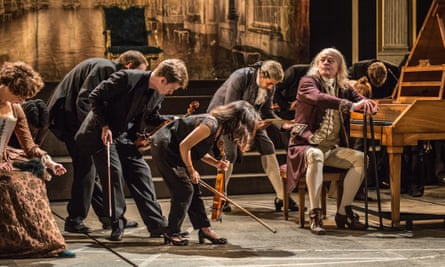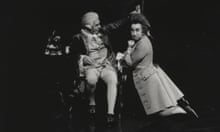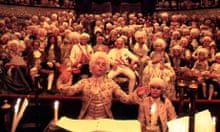Peter Shaffer, whose death in June is marked by this revival of his most popular play, once wrote that he hoped Amadeus would “enjoy a vigorous life in many differing productions”. His wish is certainly granted by Michael Longhurst’s production which turns it into an epic piece of music-theatre. It comes complete with 16 actors, six singers and the 20-strong Southbank Sinfonia and, while occasionally overblown, it reminds us of Shaffer’s talent for creating memorable theatrical spectacles.
What is startling about Longhurst’s production is that the band is fully integrated into the dramatic action. As Lucian Msamati’s Salieri strikes a bargain with God to live a virtuous life in exchange for fame, the onstage orchestra bow their heads in silent prayer. At other times, the players are more mutinous: when Salieri proudly refers to his opera, The Stolen Bucket, they disdain his plea to offer an excerpt. The singers are also, literally, to the fore: an adored Viennese soprano (lustrously sung by Fleur de Bray) is wheeled in on a portable dais and key moments from the operas of Salieri’s detested rival, Mozart, are played in full pomp downstage.

At first, I felt Salieri’s rancorous envy was in danger of being overshadowed, but Longhurst’s use of the orchestra pays increasing dividends: it evokes the feverish bustle of 18th-century Vienna and yields striking images, as when the players swarm round Salieri like supplicants to mark the hollow distinction of his later life. The director’s epic style also camouflages the weaknesses in Shaffer’s play. I know that Shaw said Sarastro’s notes in The Magic Flute provided the only music we could conceive coming out of the mouth of God. All the same, Shaffer’s insistence that Mozart was a conduit for the divine underplays his pure professional craftsmanship. By implying that Mozart’s operas were the product of heavenly inspiration, Shaffer also ignores the contribution of a great librettist such as Lorenzo da Ponte.

But, whatever its flaws, Amadeus is a stunning piece of theatre with two rich central roles. Following in the footsteps of Paul Scofield, Ian McKellen, David Suchet and Rupert Everett, Msamati is an excellent Salieri. He makes it clear that Salieri’s attack on Mozart is a perpetuation of a war with a God by whom he feels personally betrayed. Above all, Msamati captures the contrast between the public and private Salieri. Outwardly, he is the most composed of all composers. Left alone, he beats himself in anguish, not least because he is the sole person in Vienna capable of appreciating Mozart’s genius.

I have more mixed feelings about Adam Gillen’s Mozart. He captures perfectly the whinnying cackle, the potty-mouthed puerility and the belief in his own gifts: you get the point that sublime music issues from an arrested adolescent. But, with his blond curls and habit of following people with mouth agape, Gillen reminded me of nothing so much as Harpo Marx: I half expected him at some point to thrust his knee into the hands of Tom Edden’s stately Emperor.
Karla Crome rightly plays Mozart’s wife, Constanze, as a shrewd, sharp-witted figure and the supporting roles are given unusual weight by Geoffrey Beevers as a Mozart-patronising baron and Hugh Sachs as a smug opera-house director. In the end, the production works superbly because it places the human drama in the seething context of a music-dominated society; and, if there is more than a hint of Cecil B DeMille in the staging, then so there is in Shaffer’s theatrical spectacle.
- Booking at the National Theatre, London, until 26 January. Box office: 020-7452 3000. There will be an NT Live broadcast to cinemas on 2 February.






Comments (…)
Sign in or create your Guardian account to join the discussion